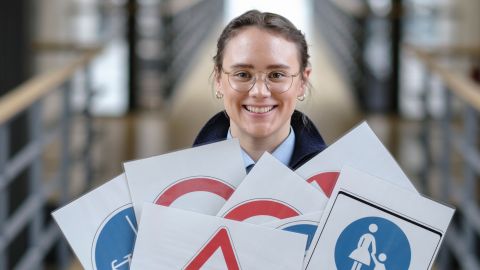Twelve-hour days used to be part of his job, as well as nights in hotels and tomato juice on planes. David Ridder packed his trolley every Sunday: suits, shirts and ties. On Mondays, he was on a plane or ICE train to Munich, Frankfurt or Wiesbaden. Always on the go. Just like the life of a consultant who works for a large auditor. Ridder's focus was on financing and balance sheets. But on his 30th birthday, the business economist asked himself: "Do I want to spend my life on the road?" He didn't want to. Ridder opted for a different career: in the police force.
Full stop, exit. A fresh start. David Ridder is not the only one to change careers in the middle of his career. Of the 2,600 or so trainee police officers who start their careers in North Rhine-Westphalia every year, many have already completed training or a degree: Some have studied business administration, like David Ridder (34). Others are teachers, like Melina Seifert (28). Or computer scientists, like Julian Schröer (30). Three of the first 100 officers to take part in the "Specialists to police officers" project, which the state government launched in 2019. The idea behind it: By the end of 2022, 300 career changers should end up where there are gaps in police personnel and knowledge.
Finance expert David Ridder's second career started on September 1, 2020 at the Heinsberg District Police, Economic Crime Division.
Brown linoleum floor, beige desk, a pin board with pins. A sign next to the door reads: KK Ridder - KK for Kriminalkommissar. "Not as stylish as the offices I used to work in," he grins. But more personal than the sterile niches in which he often sat at his old employer to analyze processes and balance sheets of large companies.
"Here you work as part of a team," says the inspector, talking about his first few days in his new job. Together with his colleagues, he unmasked the "Earl of Bristol" - a 25-year-old conman who lived in luxury hotels and drove luxury cars. The money came from the accounts of people close to him, who realized too late that he was constantly telling them lies. Ridder was present when the house was searched. "Earl of Jail" was the headline in "Bild" when the charlatan was convicted.
The case was a foretaste of the work that awaited him at the CID. Not all cases are so spectacular, but they always involve money and fraud. Gray, yellow and pink folders are piled up on Ridder's desk at the police station in Hückelhoven. In the morning, a new case has come in from the public prosecutor's office. An elderly couple let fake tradesmen into their house. Now 4,500 euros are gone.
Shock calls, grandchildren tricks, PayPal traps: Ridder is now familiar with countless scams. One classic is the eBay classifieds scam: Goods bought, sum sent via PayPal FF, goods never received, money gone - and perpetrators gone too. "Because they usually disappear online without being found," explains Ridder. But some do get caught: like the 19-year-old who collected the money for a Playstation but never delivered it. The buyer reported him. The case landed on Ridder's desk. He responded to the next complaint. The fraudster literally ran into his arms. "It's a good feeling to do something useful," says Ridder.
Where will his path lead? "There are many possibilities." He is currently taking further training courses in finance. The topic is money laundering, i.e. income from illegal transactions that looks like wages from honest work after the wash cycle. It's not just about a few thousand euros, but often millions.
Transfer to the Traffic, Traffic Inspection and Prevention Directorate in Bonn. This is where specialist Melina Seifert works. She was a trainee teacher and studied social sciences and geography at the University of Cologne. Like David Ridder, she pondered after her studies: "Am I even passionate about my job?" She also made a fresh start in 2017: in the police force.
After their three-year course, trainee inspectors actually spend at least one year on guard duty. This is followed by three years in the riot police. As a general rule, a career in the police force with riot police is only possible after this in the police or traffic department. David Ridder and Melina Seifert were allowed to take a shortcut and were transferred directly to a specialist police department. And they were joined by other career changers: a total of 83 colleagues from their recruitment year transferred to the area of crime prevention and 17 to traffic accident prevention after completing their bachelor's degree.
Since Melina Seifert has been in Bonn, there has been traffic education on Instagram, for example the post "Only poor people drive without lights".
And in Meckenheim and Rheinbach, kindergarten children and primary school pupils now greet the policewoman in the blue uniform. They know her - and little Timmi, who she always brings to class. Timmi is a magnetic figure for the blackboard that represents a pupil who always does everything wrong: not looking left and right, overlooking traffic lights and has even had an accident because he would rather chat with friends than watch out for cars.
The inspector looks after ten elementary school and 35 kindergartens. "When I stand in front of the children, I feel like a teacher," she says. But a teacher in full uniform. She asks: "Shall I tell you about Timmi?" The children scream: "Yay!" Seifert then draws a road on the blackboard with chalk, on which a pink, a yellow and a red magnetic car are driving. Timmi is standing on a kerb with his friends. Seifert asks: "Should he run over quickly?" The children shout: "No!" They learn from Timmi's mistakes how to get to school safely themselves. Rhymes help them not to forget anything. Who do you call when someone needs help? The children shout: "1-1-O-sterei, that's the number for the police!"
Commissioner and teacher. "I never thought I would be able to combine both professions," says Seifert. That's why she didn't apply at first when she joined the police and was asked during her bachelor's degree who had an additional qualification. She only got the idea that her first training with the police was in demand when the training manager approached her again directly. This was followed by internships in various areas of child and youth work. Seifert accompanied colleagues in Gummersbach who work with young criminals. At Cologne police headquarters, she got to know the traffic department. And got stuck at the Traffic Directorate.
Bicycle training, helmet checks, traffic tests. Thank-you postcards hang on a pinboard, next to a poster with traffic signs. Has she ever regretted her decision? "No, I really enjoy the work," says the young inspector. "She's an absolute fountain of youth and brings lots of new ideas with her," says Seifert's superior, Chief Superintendent Steffen Gräff. The average age in his department is 52. "I'm an old grandpa to the kids, but they think a young female inspector is great."
Criminal Investigation Department 35 in Cologne, Cybercrime/Internet Crime: Julian Schröer has three computers on his desk, one of which is intended for anonymized research. "So that I don't stand out as a police officer in my investigations," says the 30-year-old media designer, information scientist - and now inspector. Some of his colleagues are currently attending a Europol online seminar. It's about high-tech crime, data protection violations and blackmail. International cooperation is important to track down criminals online.
Schröer receives his guests in a command room. A dozen desks are arranged in a horseshoe shape, with blue screensavers flickering on some of the computers. Major situations are managed from here. But on this Monday at 4 pm, no one else is here. Instead, inspectors and IT specialists are hunting down cyber criminals in the neighboring rooms - silently, on the computer.
How does that work? It's complicated. Schröer explains how hackers send infected emails and how Trojans penetrate computers and spy on data. They are currently on the trail of a gang that has networked via darknet forums. They are now attacking the systems of large companies, administrations and infrastructure providers, such as energy suppliers and hospitals. Their goal is clear: infiltrate, paralyze - and then blackmail.
If someone had told Schröer five years ago that he would be hunting cyber criminals, he would probably have laughed. Back then, he was still working as a web designer and IT specialist, building and managing online fan stores for major soccer clubs and car companies. Friends said: "Great job." But Schröer says: "It was a superficial, fast-paced world. I worked to the limit, earned very little and really only helped to sell beer glasses and jerseys." That wasn't enough for him. At the age of 26, he applied to the police and is now part of the "Specialists to police officers" program.
Has he ever regretted his decision? Schröer says: "Not for a second. We are a young team here and can achieve a lot." It is often fraudsters who take over online banking accounts and initiate illegal transactions. They hide in the endless expanses of the Internet, but sometimes they are careless. Then Schröer has a chance. Recently, a criminal was arrested in Austria who had spied on payment data and emptied accounts. He tracked him down. He says: "It's a great feeling."




